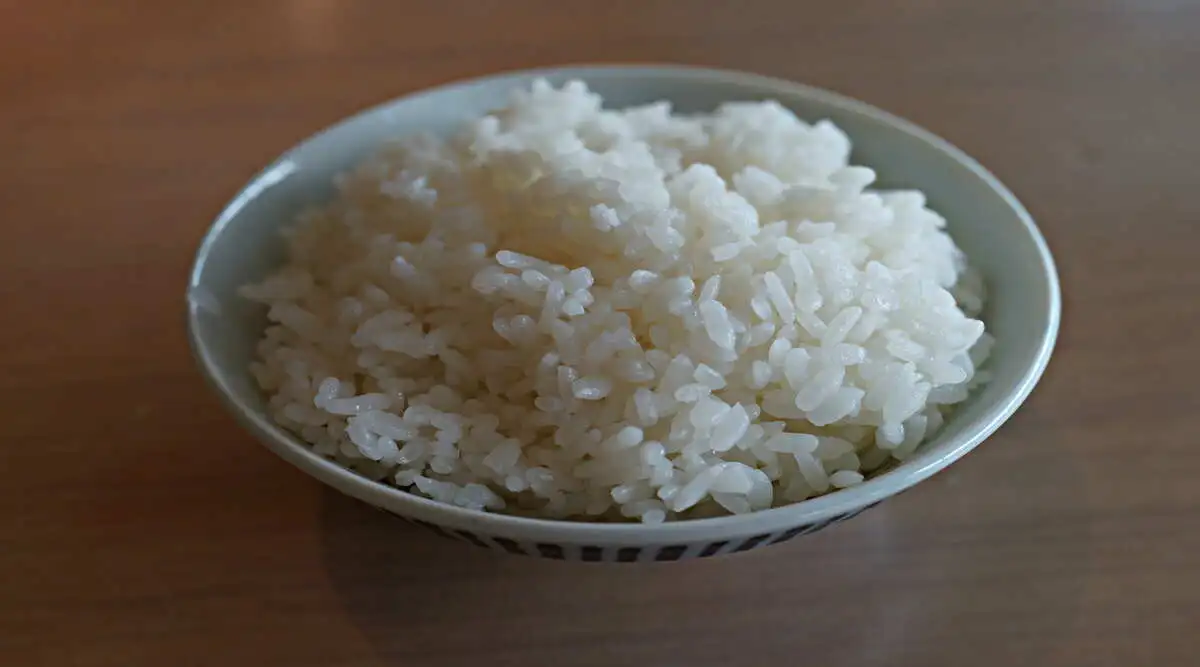Rice is a very popular cereal in all countries of the world since it is a food with excellent nutritional qualities. It is cholesterol-free, which provides a lot of health benefits because it does not contain gluten. Also, it provides a considerable amount of fiber to the body.
Nevertheless, there is a belief that eating rice at night increases belly fat. But eating rice at any time of the day does not increase belly fat or cause weight gain on its own, because weight gain occurs when there are excess calories.
That is, when you consume more calories than your body burns for “energy”, which can happen with any type of food. It is necessary to clarify that this food is rich in carbohydrates, and some people may consider that eating carbohydrates at night can cause weight gain.
However, it is important to understand that the timing of meals is not as relevant as the total calories consumed throughout the day and the types of food eaten.
Does eating rice increase belly fat?
As stated, eating rice by itself does not increase belly fat nor does it directly cause weight gain. It’s the excess calories in your diet that cause you to gain some extra pounds.
Remember, if you consume more calories than your body needs to maintain your current weight and daily activity, the excess energy will be stored as fat, especially in the belly area.
Likewise, rice is an important source of energy and nutrients. In the context of a “balanced and calorie-controlled diet”, rice (especially if it is whole grain) can be part of a healthy diet.
It is important to take into account some key points for its consumption:
- Moderation: You must control the portions and do not exceed the amount of rice you consume.
- Type of rice: You should select brown rice or whole grain rice, as they contain more fiber and nutrients than white rice.
- Balance in the diet: In addition, you must make sure that you include a variety of nutritious foods in your diet such as vegetables, fruits, lean proteins, and healthy fats.
- Active lifestyle: It is very important that you introduce physical activity into your life, which is essential to maintain a healthy weight and promote general well-being.
Remember that each person is unique and may have different caloric needs and tolerances to certain foods. If you have specific concerns about your diet or weight, you need to consult a nutritionist.
How to add rice to my diet
To include rice into your diet in a balanced and healthy way, follow the following recommendations:
Choose the right type of rice
Select brown rice as it retains the bran layer and germ, making it a more nutritious option due to its higher fiber, vitamin, and mineral content.
Control the portions
Rice is a source of carbohydrates, so portion control is essential. A typical serving of cooked rice is about 1/2 to 1 cup, depending on your caloric needs and activity level.
Combine it with other nutritious foods
You can accompany it with lean proteins (chicken, fish, tofu, or legumes) and a variety of vegetables. This will provide a balanced and nutritious meal.
Experiment with different recipes
Rice is versatile and can be adapted to different dishes and cuisines. You can try recipes such as stir-fried vegetable rice, curry rice, tofu fried rice, among others.
Control fat and sodium content
Avoid preparations that are high in saturated fat or sodium, for instance, very oily fried rice or those that contain sauces that are high in salt.
Include other types of beans
Although rice is an excellent option, it is also good to incorporate other types of whole grains. You can add quinoa, barley, or bulgur, to make variations in your diet and obtain various nutrients.
Balance your diet in general
Introducing rice is only one part of a balanced diet. You need to make sure you include a variety of nutritious foods to get all the nutrients your body needs.
Listen to your body
If you have an intolerance or sensitivity to rice or just don’t feel well after consuming it, it’s important to pay attention to your body’s signals and consider other grain options.
Types of rice that help lose weight
There are some types of rice that may be more beneficial for weight loss because of its nutritional content and its ability to maintain satiety for longer.
The types of rice that are useful for a weight loss diet are:
Brown rice
Brown rice (integral rice) preserves the bran and germ, therefore, it is richer in fiber, vitamins, and minerals compared to white rice. Likewise, the fiber in brown rice can keep you full longer, which can help control appetite and reduce overall calorie intake.
Black rice
Black rice, also known as venere rice, is another type of brown rice that is particularly rich in antioxidants such as the phytochemicals anthocyanins, which can help protect cells and contribute to better overall health.
Red rice
Red rice, like brown rice, contains more nutrients than white rice. In addition to fiber, it is also a good source of iron and zinc, both of which can be helpful in maintaining a healthy metabolism and increasing energy during the weight loss process.
It’s important to remember that while these types of rice may be more beneficial for weight loss, the most relevant factor is the number of total calories you consume and how it fits into your daily needs.
In addition, the preparation of the rice can also affect its nutritional properties; therefore, you should avoid preparations that are high in fat and sodium, such as fried rice or fatty sauces.
The best time of day to eat rice
The best time of day to eat rice depends on your eating habits, personal preferences, and health goals. In general, there is no specific time of day that is inherently better or worse for eating rice; however, here are some considerations that can help you decide when to include it in your meals:
Energy and physical activity
In addition, rice is a good source of carbohydrates, which provide your body with energy. If you have an intense physical activity planned, such as exercise or sports, eating rice before the activity can be beneficial to provide fuel and improve performance.
Diet balance
Integrate rice as part of a balanced meal that includes protein, healthy fats, and vegetables.
Satiety needs
Some people find that eating rice for dinner helps them feel full and keeps them from feeling hungry at night. The fiber in brown rice can be especially helpful in this regard.
Blood sugar control
If you are concerned about blood sugar control, you may prefer to eat rice at lunch or during the day as your body can better handle the glycemic load during these active times.
Personal sensitivity
Some people may experience bloating or digestive discomfort after consuming rice. If you notice any discomfort, consider the time of day you consume it and if it affects your well-being.
Keep in mind, that the time of day you eat rice will not be decisive for weight loss or weight gain. The most important thing is the overall balance of your diet and the total number of calories you consume. It is always advisable to adapt your diet to your individual needs and personal goals.
Frequently asked questions
Rice is naturally gluten-free, and therefore safe for people following a gluten-free diet due to celiac disease, non-celiac gluten sensitivity, or personal choice. Remember that it is essential to read the labels of processed products that contain rice, as some foods made with rice may contain additional gluten-containing ingredients.
The calories can vary depending on the brand and the way you measure it, but in general, it provides about 130 to 150 calories per 1/2 cup of cooked rice.
You should consider that rice, like other carbohydrate-rich foods, can have an impact on insulin levels in the body since when you eat carbohydrates, including rice, your body breaks down these carbohydrates into sugars (glucose), that are released into the bloodstream.
In that sense, as the level of sugar in the blood rises, the pancreas releases insulin to allow the cells to absorb the glucose and use the energy or store it for future use. Insulin helps glucose get into cells, but it can also stimulate fat storage in adipose tissue.
To keep insulin levels more stable and potentially reduce fat storage, it’s a good idea to opt for healthier, fiber-rich carbohydrate sources such as brown rice, and combine it with lean protein, healthy fats, and a variety of vegetables in your meals.
Indeed, rice can cause abdominal swelling in some people, although it is not a common reaction for the majority, and it can be related to different factors (intolerance to rice, sensitivity to gluten – in case the rice is contaminated with traces of gluten in its production or processing – fermentation in the intestine, fiber content in brown rice, and the amount and combination with other fatty foods).
The relationship between the glycemic index of rice and belly fat is related to how carbohydrates affect blood sugar levels and insulin release. The insulin response to high-glycemic foods such as white rice can influence fat storage in the body, including abdominal fat.
Insulin can also promote fat storage, especially in the abdominal area. Excess abdominal fat, specifically visceral fat (fat around internal organs), has been linked to an increased risk of chronic diseases such as type 2 diabetes, cardiovascular disease, and other health problems.
On the other hand, brown rice, with a lower glycemic index due to its higher fiber content, produces a more gradual insulin response. By preventing rapid spikes in blood sugar, brown rice may help keep insulin levels more stable and reduce the risk of excessive fat storage, including belly fat.
Conclusion
Generally, consuming rice does not increase fat in your abdomen, nor does it cause an increase in weight. In this sense, the main cause that directly influences weight is when there is an excess of calories in your diet.
The key to keeping your weight is to maintain a balanced diet and full knowledge of what calories are. Because if you consume more calories than your body requires, it will be stored as fat.
Rice is a food that provides a large amount of energy and nutrients and this should be considered to be part of an optimal diet.
Remember to follow our tips when consuming rice:
- Consume it in moderation, all excesses are harmful to your health.
- Select brown rice or whole grain rice as they contain more fiber and nutrients than white rice.
- You must balance your diet, including vegetables, fruits, lean proteins, and healthy fats.
- You must have an active lifestyle, exercising regular physical activity, which is essential to maintain a healthy weight and promote general well-being.
Also, each person is unique and may have different caloric needs and tolerances for certain foods. In the case of having specific concerns about your diet or body weight, it is necessary that you consult a specialist doctor to obtain a personalized and effective treatment.
Finally, if you have an intolerance or sensitivity to rice, or do not like it after consuming it, it is important to pay attention to your body’s signals and consider other grain options.

A. Neomar Evies es un profesor graduado y licenciado en informática. Investigador y conferencista que ha participado en diferentes eventos en diversos países. Tiene amplia experiencia en el campo de la gestión deportiva y el deporte de alto rendimiento y salud deportiva del atleta. También tiene un doctorado en Ciencias del Deporte y un Máster en administración. Como escritor ha escrito tres libros sobre sistemas de información centrados en Gestión y Deportes.





